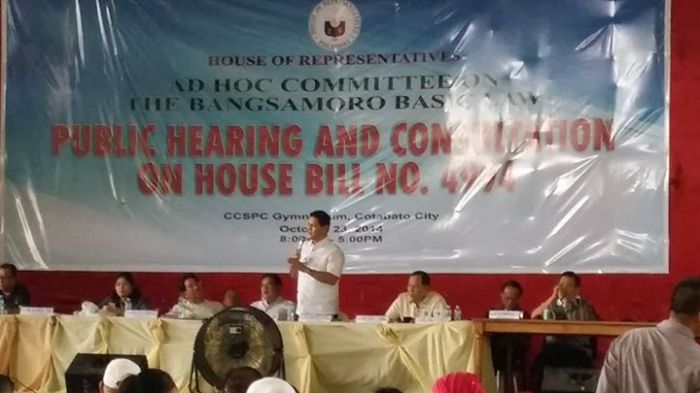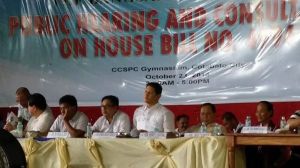 |
| Rep Raymond Menoza with BBL Ad Hoc Com hearing in Cotabato City - Oct 23 |
CEBU - Six Cebuanos in Congress said Saturday they support the government’s dream of a lasting peace in Mindanao, but would like to hear what their constituents think of the proposed Bangsamoro Basic Law.
Public consultations in Cebu may be held next month or in January 2015, said Representative Raymond Democrito Mendoza (Party-list, TUCP), one of the co-authors of House Bill 4994. He joined the 75 Mindanao district and party-list lawmakers for a public hearing in Cotabato City last Oct. 23.
“What is important is that we come to the table and try to find another solution, since the old solution which was pursued in the past 40 years has not ended the war,” Mendoza said.
Elections in 2016
Both the House and Senate versions of the draft Bangsamoro Basic Law were submitted last month, six months after the historic signing of the Comprehensive Agreement on the Bangsamoro by the Government and the Moro Islamic Liberation Front (MILF).
The Aquino administration is working on the passage of the Bangsamoro Basic Law, as well as the plebiscite in the Bangsamoro core territories, before the end of 2015, so that the first set of officials can be elected in 2016.
Five of nine Cebuano district representatives said they have yet to go over the details of the draft law and consult constituents, and could not yet categorically say whether or not they will vote for the bill. (Mendoza, the only Cebuano co-author of the bill, does not represent a district, but a party-list organization.)
Autonomy
“Thousands have risked their lives to achieve an elusive goal: peace. The Bangsamoro Basic Law is geared to give life to the constitutional provision of granting local autonomy, especially to those areas where the government has failed to provide adequate service to the people,” said Representative Gerald Anthony Gullas (Cebu Province, First District).
But while he said he was inclined to vote in favor of the bill, “nevertheless, Congress, especially those who drafted the bill, must examine piece by piece its provisions so as not to make any offensive stance against the Constitution,” Gullas also said.
Representative Benhur Salimbangon (Cebu Province, Fourth District) said he needs to study it further, having received only recently a copy of the framework agreement.
“This (Bangsamoro law) will open up the possibility of shifting our form of government to a federal one,” said Salimbangon.
According to the drafts, the Bangsamoro Government, as an autonomous region, will have “legislative powers over such matters as administrative organization and ancestral domain, which are not granted to local government units.”
However, the President will exercise general supervision, and the National Government will continue to exercise power over, among others, national defense, security, foreign relations, monetary policy, and customs and tariffs, according to a primer provided by the Office of the Presidential Adviser on the Peace Process.
Transition
Representative Raul del Mar (Cebu City, North) said he will thoroughly go over the provisions of the bill, as well as the corresponding arguments, before taking a position.
Representative Joseph Ace Durano (Cebu Province, Fifth District) said he will study how the draft Bangsamoro Basic Law reconciles the creation of this new political entity with the constitutional provisions on the creation of the Autonomous Region in Muslim Mindanao (Armm), among others.
If the basic law is passed and ratified in a plebiscite, the ARMM will be deemed abolished. A Bangsamoro Transition Authority appointed by President Benigno Aquino III will serve as the interim government, until the Bangsamoro officials are elected and can assume office.
Representative Rodrigo Abellanosa (Cebu City, South) said he will vote in favor of the Bangsamoro Basic Law if it will prove to be useful in promoting peace and unity in the country.
Abellanosa said, though, that he has many questions about the draft law.
Questions
“As previously ruled by the Supreme Court when it invalidated the 2008 memorandum of agreement on ancestral domain proposed by the previous administration, recognizing an entity ‘in preparation for independence’ violates the national integrity provisions. Hence, the next question is, ‘Does this constitute a preparation for independence of the Bangsamoro?” he said.
The congressman said he will suggest that the law “explicitly state that the Bangsamoro remains bound within the framework of the Constitution and explicitly recognizes national sovereignty.”
Both House Bill 4994 and Senate Bill 2408 provide that the National Government will retain its power over defense and external security, foreign policy, monetary policy, citizenship, postal services, immigration, some aspects of customs and tariff supervision, common market and global trade, and intellectual property rights.
The National and Bangsamoro Governments, according to the bills, will share some powers, including the power over social security, land registration, the penitentiary, auditing, civil service, justice, disaster risk reduction and management, and public order and safety.
The historic signing last March of the Comprehensive Agreement on the Bangsamoro capped negotiations that started in January 1997, facilitated beginning in 2001 by the Government of Malaysia.
By Elias O. Baquero, Isolde D. Amante and Princess Dawn H. Felicitas - SunStar



